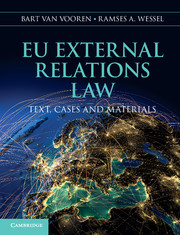Book contents
- Frontmatter
- Contents
- Table of cases
- Table of instruments and legislation
- Preface
- Acknowledgements
- List of abbreviations
- 1 The EU as a global legal actor
- 2 Instruments of EU external action
- 3 Existence of EU external competence
- 4 Nature of EU external competence
- 5 Scope and choice of EU external competence
- 6 The duty of cooperation
- 7 EU law and international law
- 8 The EU and international institutions
- 9 Common Commercial Policy
- 10 EU development policy
- 11 Common Foreign and Security Policy
- 12 Common Security and Defence Policy
- 13 The external dimension of the internal energy market
- 14 The external dimension of freedom, security and justice
- 15 The EU and its neighbours
- Index
- References
13 - The external dimension of the internal energy market
- Frontmatter
- Contents
- Table of cases
- Table of instruments and legislation
- Preface
- Acknowledgements
- List of abbreviations
- 1 The EU as a global legal actor
- 2 Instruments of EU external action
- 3 Existence of EU external competence
- 4 Nature of EU external competence
- 5 Scope and choice of EU external competence
- 6 The duty of cooperation
- 7 EU law and international law
- 8 The EU and international institutions
- 9 Common Commercial Policy
- 10 EU development policy
- 11 Common Foreign and Security Policy
- 12 Common Security and Defence Policy
- 13 The external dimension of the internal energy market
- 14 The external dimension of freedom, security and justice
- 15 The EU and its neighbours
- Index
- References
Summary
Central issues
Collaboration in the energy sector goes back to the ECSC, yet to this day no full-blown EU external energy policy exists. In this chapter we first examine the development of the EU internal energy market, focusing on how an external dimension has recently started to develop to serve EU internal needs.
Substantive dimension: the Lisbon Treaty had the purpose of strengthening coherence in EU external relations, and expressly conferred an energy competence onto the EU (Article 194 TFEU). This chapter examines policy coherence in EU external energy policy from the substantive, institutional and vertical dimensions. Here the focus lies on the relationship between energy diplomacy, security of supply and the law-based market-orientated approach. The chapter queries whether the new competence will permit a more integrated approach between different objectives of EU energy policy.
In the current setting, there is disagreement on the respective roles of the HR and the EEAS; and the Commission and the Energy Commissioner. These bodies have different perspectives on what EU external energy policy is about, with significant impact on the external dimension of the internal energy market. The strengthened role of the EP in EU external energy policy is also to be taken into account.
The progressive advancement of the internal energy market has suffered from a limited political recognition by the Member States that there was the need for a fully fledged external dimension. This is due to the continued priority of Member State national interests over the common EU interest, leading to a significant lack of Member State compliance with Union law on the path to completing the internal market. Similar processes can be observed in the external dimension of the internal energy market, and this chapter therefore pays significant attention to the duty of cooperation as it has been formalized in a legally binding instrument at the end of 2012.
- Type
- Chapter
- Information
- EU External Relations LawText, Cases and Materials, pp. 438 - 474Publisher: Cambridge University PressPrint publication year: 2014



